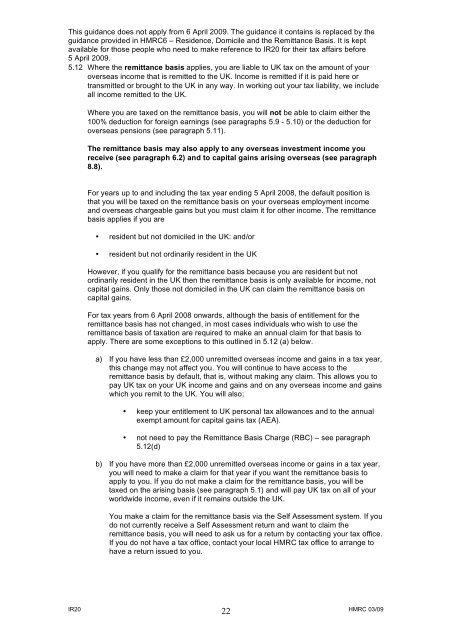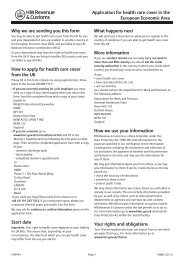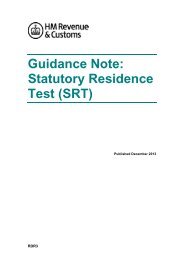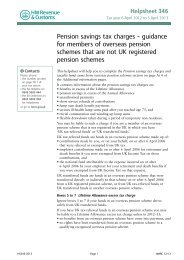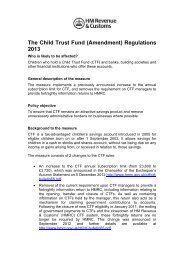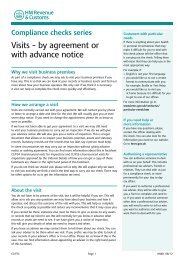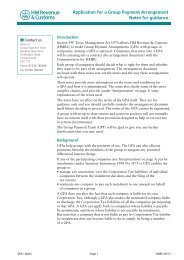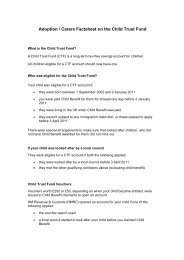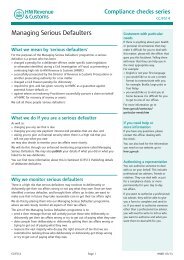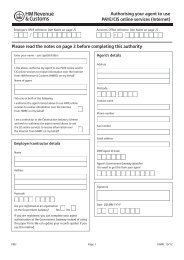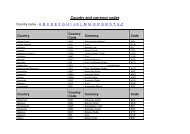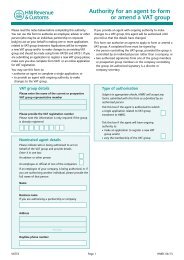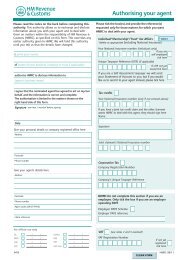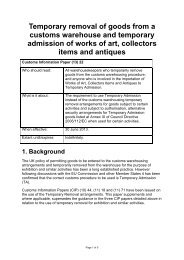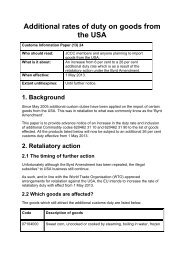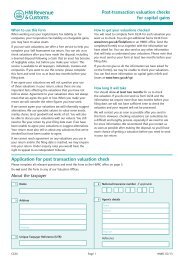IR20 - Residents and non-residents liability to tax in the United ...
IR20 - Residents and non-residents liability to tax in the United ...
IR20 - Residents and non-residents liability to tax in the United ...
You also want an ePaper? Increase the reach of your titles
YUMPU automatically turns print PDFs into web optimized ePapers that Google loves.
This guidance does not apply from 6 April 2009. The guidance it conta<strong>in</strong>s is replaced by <strong>the</strong><br />
guidance provided <strong>in</strong> HMRC6 – Residence, Domicile <strong>and</strong> <strong>the</strong> Remittance Basis. It is kept<br />
available for those people who need <strong>to</strong> make reference <strong>to</strong> <strong>IR20</strong> for <strong>the</strong>ir <strong>tax</strong> affairs before<br />
5 April 2009.<br />
5.12 Where <strong>the</strong> remittance basis applies, you are liable <strong>to</strong> UK <strong>tax</strong> on <strong>the</strong> amount of your<br />
overseas <strong>in</strong>come that is remitted <strong>to</strong> <strong>the</strong> UK. Income is remitted if it is paid here or<br />
transmitted or brought <strong>to</strong> <strong>the</strong> UK <strong>in</strong> any way. In work<strong>in</strong>g out your <strong>tax</strong> <strong>liability</strong>, we <strong>in</strong>clude<br />
all <strong>in</strong>come remitted <strong>to</strong> <strong>the</strong> UK.<br />
Where you are <strong>tax</strong>ed on <strong>the</strong> remittance basis, you will not be able <strong>to</strong> claim ei<strong>the</strong>r <strong>the</strong><br />
100% deduction for foreign earn<strong>in</strong>gs (see paragraphs 5.9 - 5.10) or <strong>the</strong> deduction for<br />
overseas pensions (see paragraph 5.11).<br />
The remittance basis may also apply <strong>to</strong> any overseas <strong>in</strong>vestment <strong>in</strong>come you<br />
receive (see paragraph 6.2) <strong>and</strong> <strong>to</strong> capital ga<strong>in</strong>s aris<strong>in</strong>g overseas (see paragraph<br />
8.8).<br />
For years up <strong>to</strong> <strong>and</strong> <strong>in</strong>clud<strong>in</strong>g <strong>the</strong> <strong>tax</strong> year end<strong>in</strong>g 5 April 2008, <strong>the</strong> default position is<br />
that you will be <strong>tax</strong>ed on <strong>the</strong> remittance basis on your overseas employment <strong>in</strong>come<br />
<strong>and</strong> overseas chargeable ga<strong>in</strong>s but you must claim it for o<strong>the</strong>r <strong>in</strong>come. The remittance<br />
basis applies if you are<br />
• resident but not domiciled <strong>in</strong> <strong>the</strong> UK: <strong>and</strong>/or<br />
• resident but not ord<strong>in</strong>arily resident <strong>in</strong> <strong>the</strong> UK<br />
However, if you qualify for <strong>the</strong> remittance basis because you are resident but not<br />
ord<strong>in</strong>arily resident <strong>in</strong> <strong>the</strong> UK <strong>the</strong>n <strong>the</strong> remittance basis is only available for <strong>in</strong>come, not<br />
capital ga<strong>in</strong>s. Only those not domiciled <strong>in</strong> <strong>the</strong> UK can claim <strong>the</strong> remittance basis on<br />
capital ga<strong>in</strong>s.<br />
For <strong>tax</strong> years from 6 April 2008 onwards, although <strong>the</strong> basis of entitlement for <strong>the</strong><br />
remittance basis has not changed, <strong>in</strong> most cases <strong>in</strong>dividuals who wish <strong>to</strong> use <strong>the</strong><br />
remittance basis of <strong>tax</strong>ation are required <strong>to</strong> make an annual claim for that basis <strong>to</strong><br />
apply. There are some exceptions <strong>to</strong> this outl<strong>in</strong>ed <strong>in</strong> 5.12 (a) below.<br />
a) If you have less than £2,000 unremitted overseas <strong>in</strong>come <strong>and</strong> ga<strong>in</strong>s <strong>in</strong> a <strong>tax</strong> year,<br />
this change may not affect you. You will cont<strong>in</strong>ue <strong>to</strong> have access <strong>to</strong> <strong>the</strong><br />
remittance basis by default, that is, without mak<strong>in</strong>g any claim. This allows you <strong>to</strong><br />
pay UK <strong>tax</strong> on your UK <strong>in</strong>come <strong>and</strong> ga<strong>in</strong>s <strong>and</strong> on any overseas <strong>in</strong>come <strong>and</strong> ga<strong>in</strong>s<br />
which you remit <strong>to</strong> <strong>the</strong> UK. You will also;<br />
• keep your entitlement <strong>to</strong> UK personal <strong>tax</strong> allowances <strong>and</strong> <strong>to</strong> <strong>the</strong> annual<br />
exempt amount for capital ga<strong>in</strong>s <strong>tax</strong> (AEA).<br />
• not need <strong>to</strong> pay <strong>the</strong> Remittance Basis Charge (RBC) – see paragraph<br />
5.12(d)<br />
b) If you have more than £2,000 unremitted overseas <strong>in</strong>come or ga<strong>in</strong>s <strong>in</strong> a <strong>tax</strong> year,<br />
you will need <strong>to</strong> make a claim for that year if you want <strong>the</strong> remittance basis <strong>to</strong><br />
apply <strong>to</strong> you. If you do not make a claim for <strong>the</strong> remittance basis, you will be<br />
<strong>tax</strong>ed on <strong>the</strong> aris<strong>in</strong>g basis (see paragraph 5.1) <strong>and</strong> will pay UK <strong>tax</strong> on all of your<br />
worldwide <strong>in</strong>come, even if it rema<strong>in</strong>s outside <strong>the</strong> UK.<br />
You make a claim for <strong>the</strong> remittance basis via <strong>the</strong> Self Assessment system. If you<br />
do not currently receive a Self Assessment return <strong>and</strong> want <strong>to</strong> claim <strong>the</strong><br />
remittance basis, you will need <strong>to</strong> ask us for a return by contact<strong>in</strong>g your <strong>tax</strong> office.<br />
If you do not have a <strong>tax</strong> office, contact your local HMRC <strong>tax</strong> office <strong>to</strong> arrange <strong>to</strong><br />
have a return issued <strong>to</strong> you.<br />
<strong>IR20</strong> 22<br />
HMRC 03/09


